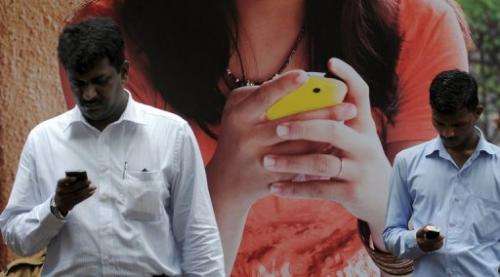Two men check their mobile phones while standing in front of an advertisement for a cellular network in Mumbai in September. India's government announced on Wednesday it had raised one-quarter of what it expected from an auction of mobile spectrum that telecom industry critics said had been overpriced.
India's government announced on Wednesday it had raised one-quarter of what it expected from an auction of mobile spectrum that telecom industry critics said had been overpriced.
Prime Minister Manmohan Singh's government hoped to raise 400 billion rupees ($7.2 billion) from the auction of second-generation (2G) spectrum to help close a gaping budget deficit.
Instead it raised 94 billion rupees and just 35 percent of the airwaves received bids in the auction that ended after two days when offers stopped coming.
"This is a market and that is how it plays itself out," Telecom Minister Kapil Sibal said after the sale was over, declining to comment further.
The auction was held after the Supreme Court earlier this year cancelled 122 licences for eight firms, saying the 2008 sale of the permits had been tainted by corruption that cost the treasury as much as $39 billion in lost revenues.
A slew of people including a former telecoms minister, senior bureaucrats and corporate executives, have been charged with corruption over the 2008 sale that has ballooned into one of India's biggest-ever political scandals.
The lacklustre response from telecom companies to the sale contrasts with the 2010 auction of faster third-generation (3G) mobile airwaves that lasted more than a month in which the government raised over $12 billion.
Two foreign operators—Norway's Telenor and Britain-based Vodafone Group—and three local firms—Bharti Airtel, Idea Cellular and Videocon Industries—took part in this week's auction.
Critics said the government-set starting price of 140 billion rupees for a slot embracing all of India's 22 telecom zones—over seven times what companies paid in 2008 for bandwidth—was too expensive and deterred bidders.
(c) 2012 AFP
























